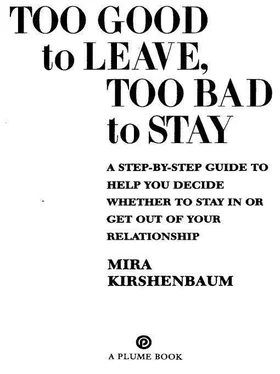Kirshenbaum, Mira - Too Good to Leave, Too Bad to Stay
Здесь есть возможность читать онлайн «Kirshenbaum, Mira - Too Good to Leave, Too Bad to Stay» весь текст электронной книги совершенно бесплатно (целиком полную версию без сокращений). В некоторых случаях можно слушать аудио, скачать через торрент в формате fb2 и присутствует краткое содержание. Жанр: Психология. Описание произведения, (предисловие) а так же отзывы посетителей доступны на портале библиотеки ЛибКат.
- Название:Too Good to Leave, Too Bad to Stay
- Автор:
- Жанр:
- Год:неизвестен
- ISBN:нет данных
- Рейтинг книги:3 / 5. Голосов: 1
-
Избранное:Добавить в избранное
- Отзывы:
-
Ваша оценка:
- 60
- 1
- 2
- 3
- 4
- 5
Too Good to Leave, Too Bad to Stay: краткое содержание, описание и аннотация
Предлагаем к чтению аннотацию, описание, краткое содержание или предисловие (зависит от того, что написал сам автор книги «Too Good to Leave, Too Bad to Stay»). Если вы не нашли необходимую информацию о книге — напишите в комментариях, мы постараемся отыскать её.
Too Good to Leave, Too Bad to Stay — читать онлайн бесплатно полную книгу (весь текст) целиком
Ниже представлен текст книги, разбитый по страницам. Система сохранения места последней прочитанной страницы, позволяет с удобством читать онлайн бесплатно книгу «Too Good to Leave, Too Bad to Stay», без необходимости каждый раз заново искать на чём Вы остановились. Поставьте закладку, и сможете в любой момент перейти на страницу, на которой закончили чтение.
Интервал:
Закладка:
Both because she wanted to meet him personally and because she wanted to find a way to give him agency money, Theresa arranged for them to have dinner together. Soon they were seeing more and more of each other. They found they shared a wide range of beliefs and attitudes, particularly about the terrible psychological burden of growing up poor in the ghetto and about how important it was to devote resources to helping the people there. They found they liked the same music. They found they liked the same movies and liked seeing them at home on videotape with a pizza. They found they liked the same things in sex.
Speaking of movies, if this were one of those movies from the thirties you could imagine the pages of a calendar slowly flipping one after another to indicate the months passing. And that’s because that’s how long it took for Theresa to realize that something terrible was happening.
If only her hero had feet of clay for her. But for her he had the cloven-hoofed feet of the devil.
A Wolf in Shrink’s Clothing. It all began sadly enough with the very thing that had made Paul a god to her: his insights and his desire to improve things. She praised him so much for this that it was hard for her to see what was happening inside her when he started turning his insights and his desire to improve things toward her. In her love and innocence she laid bare to him all of her faults and fears. After all, doesn’t love mean never having to say you’re sorry you let your partner see you naked?
And that’s where she found he was jumping all over her. It began seemingly gently, with insights alone. He merely “pointed out” things to her. As she later said to me, “You wouldn’t believe how many conversations we had where all I said was ‘I know’ and ‘you’re right’ and ‘that’s true.’ ”
“Let Me Tell You What’s Wrong with You.” At first these insights were relatively neutral—things like his pointing out the connection between Theresa’s always putting things off until the last minute and the way her parents had been permissive bringing her up. But once Paul softened her up for receiving his insights they started getting more critical. It wasn’t just his saying that she had a tendency to be late, but that she had a lax, lazy, sloppy orientation to life.
It was hard for her to resist even this kind of critical insight, because it would seem as though any attempt at resistance would exhibit the very flaws of laziness and defensiveness that he was criticizing her for, Then, with a well-established basis between them for his telling her what was wrong with her, he started telling her what to do to improve herself in every part of her life.
He told her what she should eat—certainly much less than she’d been eating—and how she should exercise more and more.
He told her how, since she had so many ill-informed, ill-conceived ideas about things, she should study before she offered an opinion about issues she’d felt confident talking about before, and how could she argue with him since he seemed so confident and so right about everything?
He told her that since she was so bad with money—something she didn’t see until he’d pointed it out to her—she should give her money to him to invest for her besides tithing ten percent of her money by giving it to charities he worked for on contract.
For a long time, Theresa accepted all this destructive overinvolvement as Paul’s way of expressing his love and caring and concern, or at worst as an expression of his perfectionism, which after all led him to accomplish so much, which was why she’d admired him in the first place.
“I’m Only Doing This Becauee I Hate You.” But eventually and with growing shock Theresa came to realize the degree to which the way Paul treated her when they were close was fueled by tremendous anger, if not hatred.
He was cold to her much of the time, she realized. He kept fueling a hunger in her for them to get close again the way they used to. Then he used her hunger for closeness as a way to exact a willingness in her to put up with his harsh judgments of everything about her. He enticed her with a promise of the kind of soft, safe intimacy they’d had at first, but only when she was good again, only when she was perfect.
One weekend she was in bed with a bad cold. She hoped he’d take care of her or at least leave her alone. But Paul seemed to find her pain and vulnerability the perfect opportunity for him to tell her how her cold was a sign of how little she knew about taking care of herself, of all the toxins she’d allowed to grow within her. The only way she could purge herself, he said, was for him to sit there and for her to diedge up every weak or erroneous or evil thought or feeling she’d ever had.
It was, she realized, a kind of brainwashing he was putting her through. And she was suddenly struck by what seemed obvious the minute it hit her: that he was a man filled with hate and anger and destructiveness. And he loved intimacy only for the opportunity it offered to inflict pain and damage.
Why had it taken her so long to see all this? Partly it was his public role. He really did do good work in the community. Partly it was the gradualness with which he eased into destructive criticism in seeming lockstep with their developing intimacy. And partly it was her hunger for closeness, which made it so hard for her to see the price she was paying for getting close.
Don’t Be Cruel
Theresa’s story is just an extreme example of the way getting hurt as you’re getting close is an essential part of their experience of intimacy for some people, not an accidental part. This was not simply the case of somebody bringing up a deeply personal memory and having their partner misunderstand or fail to respond adequately. This was not just the case of a critical remark uttered during a moment of closeness which turned out to be far more cutting and cruel than the person who said it could have imagined. Intimacy can survive these mishaps.
But Theresa’s story illustrates the comer you can turn and that you have to watch out for. There’s no objective way to measure when you’ve turned this comer. But here’s the guideline:
GUIDELINE #32
It’s normal to get hurt occasionally when you get close to someone, but if you feel that your partner’s main interest in getting close to you is making you feel his anger and criticism, then you’ll never feel close or safe in your relationship and you’ll be happier if you leave than if you stay. Quick take: If getting close to your partner feels like you’re getting into the boxing ring with him or her, then it’s time to end the match.
Here’s how to apply this guideline. In our relationships, none of us like to feel constantly criticized and judged and controlled and micromanaged. Most of the time, though, as long as you’re not dealing with the kind of power person I described in the “You’ve Got a Hold on Me” chapter who’s mainly interested in obliterating your needs, you can let your partner know that you’re starting to feel judged and he’ll back off. And most of the time there are safe havens of closeness in your relationship where criticism and judgment drop away and as you get more intimate you’re more appreciative of each other.
This guideline focuses on those people who turn this upside down and inside out, who are invested in not backing off their criticism and who are eager to get close to you so they can inflict their judgments on you. Instead of providing safety they destroy it. That’s when you know you’ve got to leave.
But I don’t want to emphasize the idea of criticisms. This guideline could apply without your partner ever being critical. The key is your feelings. The key is your sense that you’re living in a topsy-turvy world with your partner where, for whatever reason, distance feels better than closeness, where distance feels safer than closeness, where instead of seeking out closeness you avoid it as a place where you sense bad things will happen to you.
Читать дальшеИнтервал:
Закладка:
Похожие книги на «Too Good to Leave, Too Bad to Stay»
Представляем Вашему вниманию похожие книги на «Too Good to Leave, Too Bad to Stay» списком для выбора. Мы отобрали схожую по названию и смыслу литературу в надежде предоставить читателям больше вариантов отыскать новые, интересные, ещё непрочитанные произведения.
Обсуждение, отзывы о книге «Too Good to Leave, Too Bad to Stay» и просто собственные мнения читателей. Оставьте ваши комментарии, напишите, что Вы думаете о произведении, его смысле или главных героях. Укажите что конкретно понравилось, а что нет, и почему Вы так считаете.












